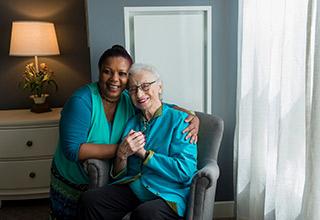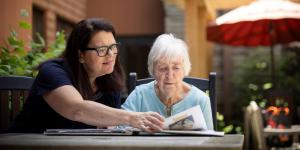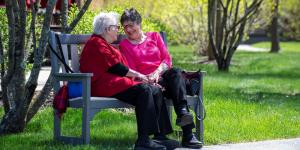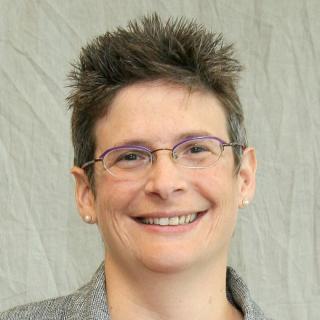Caring for a Parent While Navigating Your Own Retirement
Read about the advantages of being an older caregiver and get tips on navigating the challenges.
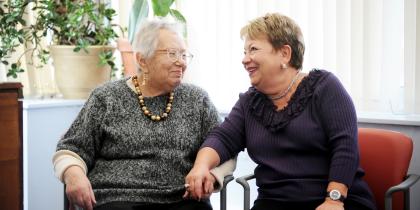
As the average life expectancy rises, parents are living longer as their children continue deeper into adulthood. Many caregivers of older people are themselves older adults. The average age of caregivers of older adults is 63, and some caregivers have their own age-related medical conditions to manage! Caregivers are aging along with those they care for, resulting in retirement-aged adult children caring for their older parents.
As a social worker in the short-term rehabilitation unit and long-term chronic care memory support units at Hebrew Rehabilitation Center, I have seen adult children taking care of parents who are in their 90s. Older caregivers often have a unique and valuable set of tools they can employ when caring for their loved ones. No matter your age, providing care to someone you love is a commitment.
While this blog post focuses on older adult children caring for their parents, many of the advantages and challenges of being an older caregiver that I discuss also apply to those caring for a partner or other loved one.
Advantages of being an older caregiver
Older caregivers have two major advantages: life experience and connections. Caregiving for someone you love takes a great amount of energy and can take a heavy emotional toll. Older people with more life experience likely have a deeper well of emotional history to draw from.
Older caregivers often have coping mechanisms they developed throughout a lifetime of navigating their emotions. Because of this, an older person may have a deeper sense of sympathy or empathy when dealing with daily caregiving stressors.
Outside of their own life experience, older people can draw on the life experiences of peers who might be able to offer advice or know of good resources. You can take advantage of professional, personal, and religious networks you have built — whether it’s a coworker whose father has dementia or a friend dealing with their mom’s stroke.
The challenges of being an older caregiver
While there are advantages to providing care as an older adult, there can also be challenges. While older adults often have larger networks, that isn’t the case for everyone. As we age, we lose people around us. If your social circle has shrunk, you may be at a greater risk of isolation.
Older caregivers might be dealing with their own medical complications. Things you used to do to care for your parents might be more difficult, such as driving at night. Even those fortunate enough to be in good health might not have the energy reserves required for committed, long-term caregiving — not to mention those who have been providing care for a long time already!
You may have imagined retirement as a time to focus on yourself — to travel, rest, or spend time with grandchildren. However, it can be hard to go into retirement thinking that it’s “your time” to do what you want and having to balance that with the demands of caregiving.
Naturally, those kinds of pressures can create cycles of resentment and guilt. However, prioritizing social connection can be immensely valuable to maintaining your emotional well-being. In fact, one study found that higher perceived social support is linked to a more positive caregiving experience!
Even if your personal network isn’t as large as it used to be or you’re managing your own health conditions, caregiver support groups and resources can help you foster meaningful connections with people who deeply relate to your experiences. Additionally, local resources for caregivers can give you opportunities to focus on your own needs and minimize the risk of burnout. Remember that you aren’t meant to do this on your own!
The dangers of caregiver burnout
Regardless of your age, providing care is an extremely demanding task that requires hard-to-muster patience and attention to detail. It can cause high levels of stress that can take an emotional toll; understandably, the energy and effort you allot to caregiving may leave you with less energy to prioritize your own well-being.
Studies show that caregiving can impact health because people unintentionally neglect their own needs by putting the needs of others above their own. One in ten caregivers has reported that caregiving has caused their physical health to get worse, making self-care even more important.
When a caregiver neglects their own needs, combined with the stress and emotional taxation of caregiving, they’re more susceptible to becoming depressed or burned out. That makes it increasingly challenging to deliver quality care. If you, as the caregiver, have a medical issue, that can be a problem for the person you are taking care of. Taking care of yourself is important for your own sake as well as for theirs!
As the popular saying goes, “It’s a marathon, not a sprint.” Those who treat it like a sprint will very quickly run out of energy.
Older caregivers can be under more mental stress. Even though you might have more free time, that doesn’t mean it’s realistic for you to devote all your spare time to overtime care. That can lead to worry and guilt that you are not doing enough for your parent, even though you are probably already doing everything you can.
That’s why it’s imperative that caregivers stay on top of their own health: going to annual check-ups, dentist visits, and mental health appointments. On an everyday basis, caregivers should also make sure they are doing their best to get enough sleep, eat well, and maintain some sort of exercise routine.
If those pieces of lifestyle advice feel challenging to manage on any given day, try seeking out five minutes to yourself while your loved one is engaged in another activity. Small moments of refuge can be impactful, too! Our blog post on practical self-care for caregivers offers a few suggestions for finding a few moments of time when you don’t feel like you have any for yourself.
Resources for senior caregivers in the Boston area
It’s important for caregivers to reach out to their community. For Boston residents, Boston ElderINFO has a hotline for senior resources, and those who live elsewhere in Massachusetts can contact their local Aging Services Access Point. The Alzheimer’s Association has a 24/7 hotline offering support for people living with dementia and their caregivers.
You can also reach out to the senior center or Council on Aging in your town to find out what’s available, such as support groups and programs you might be eligible for. Some primary care doctors’ offices, especially those with a focus on geriatrics, will have resources as well. Read more about community resources for caregivers.
Hebrew SeniorLife offers a number of supports for Boston-area older adults and their caregivers:
- Visiting nurses can provide medical home health care, including post-surgical care, acute illness care, and physical, occupational, and speech therapies. Home health services are covered by Medicare, as long as they are prescribed by a doctor.
- Private aides can provide non-medical care in the home, such as help with bathing, feeding, grocery shopping, companionship, and more.
- The Deanna and Sidney Wolk Center for Memory Health offers support for caregivers of people with dementia, including support groups, individual and family counseling, and caregiver education.
- If caring for your relative at home becomes too difficult, or your relative is becoming isolated and would have a better quality of life living among other older adults, we offer assisted living and long-term chronic care, including memory support.
What if the demands of caregiving become too much?
Aging in place is a common choice for many older adults, allowing them to remain in the comfort of their own homes. However, if regularly coordinating your loved one’s care is becoming increasingly overwhelming and is significantly impacting your quality of life, it may be time to explore other living options.
Are you interested in learning more about what Hebrew SeniorLife offers, or wondering which option might be right for your situation? We’d love to talk with you about how we can best support you and your loved one! Find a service or community today to request more information.
Join Our Community: Subscribe to the Hebrew SeniorLife blog for weekly insights on healthy aging and senior living.
Blog Topics
Learn More
Home Health
Hebrew SeniorLife Home Health will send registered nurses and home health aides to your home to provide skilled care any time you need it.
Wolk Center for Memory Health
The Deanna and Sidney Wolk Center for Memory Health at Hebrew SeniorLife provides outpatient memory care services, in person and virtually, for people living with cognitive symptoms — and for their families and caregivers.
